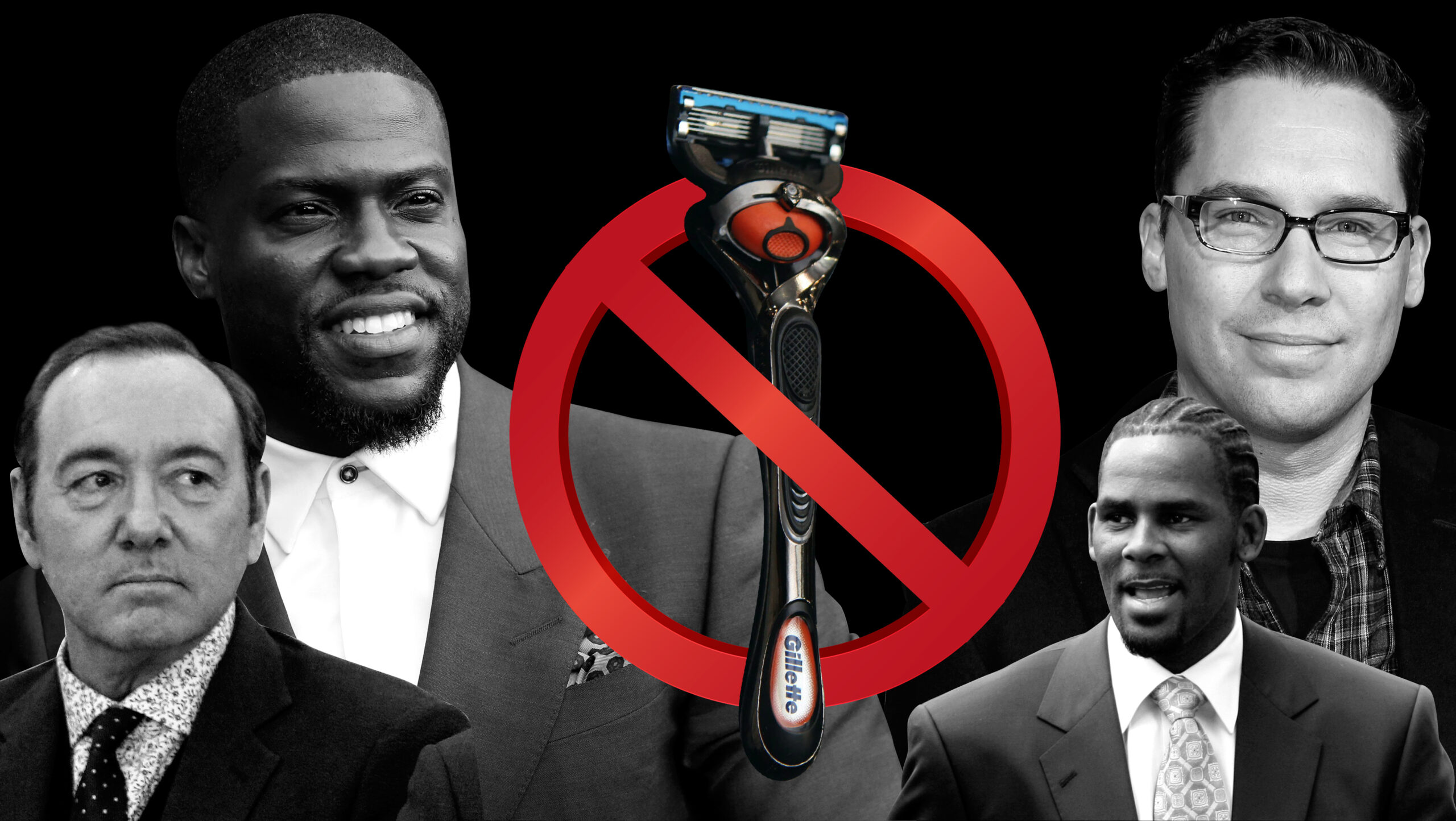We’re two weeks into 2019 and it has already been a bumpy ride for macho and right-wing men. While the last year of the #MeToo movement has been about sharing women’s stories, now it seems that ever increasingly (if still maddeningly slowly), toxic masculinity and our “boys will be boys” culture is being held accountable — much to the anger, fear and hysteria of many men.
Here is what’s happened so far:
APA study says traditional masculinity is toxic for men, men respond with toxicity
The American Psychological Association (APA) put out guidelines last August on traditional masculinity and its harm on boys and men. The report takeaway is that traditional masculinity — aggressiveness, dominance, competitiveness, homophobia, emotional stoicism, self-reliance — and messages like “boys don’t cry” causes them to suppress their emotions. Men’s takeaway? That the report said being a man was a sickness.
Though the report was already months old, media reported the APA’s Guidelines for Psychological Practice With Boys and Men findings earlier this year. A compilation of more than 40 years of research, it found that men are 3.5 times more likely to die by suicide than women and commit 90 percent of homicides (and make up 77 percent of victims). Boys face more challenges at school than girls, including harsher punishments, and boys engaged in more homophobic taunting.
For boys who were part of more than one minority group, such as boys of colour or boys who are gay, the report found that they have a difficult time with identity-related conflicts, possibly deciding to negate one identity for the other in order to fit in.
But one of the most worrisome conclusions from the guidelines was that men who adhered to traditional masculinity and its values were less likely to seek mental health supports than those who had more open attitudes toward gender.
Alas, hard facts on how toxic masculinity harms men and boys — something we already knew, albeit — and a chance to start changing the conversation, especially among men. Instead, many men (and women) on the right called the report a war on men, some outright defending traditional masculinity and calling the report “emasculating.”
R Kelly’s history of violence and abuse is put on blast, accomplices get dragged too
The stomach-turning, six-part Lifetime series Surviving R Kelly, which started airing on Jan 3, put the music industry’s best-known secret on full blast. Several of Kelly’s survivors revealed not just the monstrosity of Kelly but his devoted circle of enablers. The documentary weaves together the harrowing stories of Black and brown women whose voices have long been silenced or ignored when talking about sexual assault, and draws on interviews with musicians and members of Kelly’s own entourage who were complicit in his crimes.
The documentary has also led to a game-changing shift in demanding accountability among Black men in Hollywood. Terry Crews, a sexual assault survivor, has been vocal about the dismissal of Black women’s stories of sexual assault in the industry. He also called out Kevin Hart for the way he handled his homophobic tweets, gaining the respect and admiration on Twitter as the realest one. Nas has also called out Jay-Z, saying the rapper knew about Kelly’s past when they collaborated.
Though decades too late, artists including Lady Gaga, Chance the Rapper and Celine Dion have started pulling their collaborations with Kelly from streaming services.
It’s definitely been a bad month for Kelly, made even worse by Chicago police, who have visited his home several times following the airing of the documentary.
Bohemian Rhapsody wins Golden Globe awards, says “Show Must Go On” to Bryan Singer
When the biopic about Queen frontman Freddie Mercury won best picture on Jan 6, there was zero mention of Bryan Singer, the director of the film, in the acceptance speech. And when the film’s star, Rami Malek, won best actor in a drama, Singer’s name didn’t come up either.

Credit: bryanjaysinger/Instagram
That’s because Singer, who has a history of unprofessional behaviour, was fired from the film in late 2017, two weeks before shooting wrapped. There were numerous issues, including reportedly not showing up to set, throwing equipment and fighting with Malek. Singer was also facing a lawsuit over allegations that he raped a 17-year-old boy at a party in 2003.
Singer acknowledged the best picture win on Instagram with an obnoxious post from the set in which he is sitting in a chair labelled “director” — but the rest of the cast and crew are still treating him as the Invisible Man.
Kevin Spacey pleads not guilty to indecent assault, then gets pulled over for speeding
Kevin Spacey finally came out of hiding to attend a court hearing in Nantucket, Massachusetts, to plead not guilty to groping an 18-year-old busboy in 2016.
Spacey was arranged on a charge of felony indecent assault and battery on Jan 7. If he’s found guilty, he could face up to five years in prison.
Spacey has been hit with numerous sexual misconduct allegations that have spanned decades, and more than 30 people have accused him of sexual assault.
And it gets even stranger: Weeks before the arraignment, Spacey posted a bizarre video called “Let Me Be Frank,” in which he tries to defend himself — with a Southern accent, the same as his House of Cards character Frank Underwood. Then, after the court appearance, Spacey was pulled over for speeding and just given a warning. Warnings are where Spacey has been able to hide for years — that is, until now.
An ad from Gillette asks men to do better, men (and women) respond by being the worst
Gillette asked men to stop harassing and beating people up. Now, men are angry at razors.
Shaving products brand Gillette did something that major corporations, just mere years ago, would never take a chance on. Its recent ad targets toxic masculinity and the enabling of a “boys will be boys” attitude in the #MeToo era, adding a new take on its mantra, “the best a man can get.” The short commercial video, published Jan 13, also tackles bullying, gender-based stereotypes and the importance of accountability.
It was too close a shave for many men’s rights activists and right-wingers, who were not happy about men being asked to be less terrible to women and other men. Mass hysteria ensued: ranting posts about the ad being “hideously woke,” “a global assault on masculinity” and “emasculating”; a flooding of dislikes on the YouTube video that has surpassed the number of likes; and men who felt so personally victimized by a razor that they decided to boycott the company and take their business elsewhere.
Men boycott Gillette for Dollar Shave Club and Axe, not realizing that both have boycotted toxic masculinity
In light of the Gillette boycott, men have vowed to never shave again or, less dramatically, switch to other popular brands such as Dollar Shave Club and Axe. But wait! In their blinding masculine anger and spite, these men have forgotten that both brands also think toxic masculinity is a big problem.
In 2017, Axe ran a campaign similar to Gillette’s, partnering Promundo, a male grooming brand. Together, the brands launched The Man Box report, which looked at how masculinity and socialization affects the lives of young boys and girls. Axe has also tackled questions of gender, homophobia and masculinity in past campaigns.

Credit: @hansmollman/Twitter
As for Dollar Shave Club: It’s been redefining masculinity through Mel Magazine, the publication extension of Unilever: stories on covering men in the #MeToo era, first-person essays detailing the vulnerabilities and insecurities of being a man today, and — gasp! — the prevalence of toxic masculinity around the world — not your typical man rag.
Men don’t realize that Unilever owns Dollar Shave Club and Axe
So I guess no-shave 2019?
Legacy: January 17, 2019 2:32 pmAn earlier version of this story incorrectly stated that Unilever owns Gillette. Gillette is owned by Procter & Gamble.


 Why you can trust Xtra
Why you can trust Xtra


